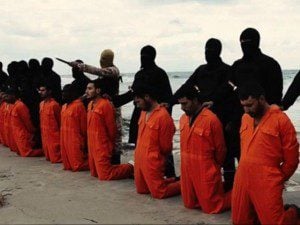
No doubt, the Apostle Peter had Jesus’ words recorded in Matthew in mind when he encourages and exhorts Christians to suffer for righteousness’ sake, not murder, thievery, evil, meddling—and no doubt deception like tax evasion:
Beloved, do not be surprised at the fiery trial when it comes upon you to test you, as though something strange were happening to you. But rejoice insofar as you share Christ’s sufferings, that you may also rejoice and be glad when his glory is revealed. If you are insulted for the name of Christ, you are blessed, because the Spirit of glory and of God rests upon you. But let none of you suffer as a murderer or a thief or an evildoer or as a meddler. Yet if anyone suffers as a Christian, let him not be ashamed, but let him glorify God in that name (1 Peter 4:12-16; for the fuller context of Peter’s development of this theme, see 1st Peter 3:8-22 and 1st Peter 4:12-19).
Indeed, it sounds like he is alluding to “Blessed are those who are persecuted for righteousness’ sake, for theirs is the kingdom of heaven” (Matthew 5:10; ESV).
Peter’s words were timely given that his audience was facing various trials. His words are also timely today given that many Christians in the States could be taken by surprise when they suffer persecution. One reason why many Christians might be surprised is because we are often told that we are “the King’s kids” and that we should not suffer as God’s royal people. Just the other day, someone challenged me by saying godly Christians don’t suffer since we are God’s children. Some “prosperity gospel” advocates may go so far as to flip it around when it suits them; for example, they may claim they are suffering for their faith when experiencing discipline for acting as if they are above the law as “the King’s kids” by not paying taxes to the government. While it is true that we belong to God’s kingdom, we are not above the law of the land; after all, as Paul tells us, the ruler does not bear the sword in vain (Romans 13:1-7; note his point on paying taxes). Moreover, Jesus’ law of his kingdom set forth in the Sermon on the Mount does not excuse us from keeping laws that benefit the common good; rather, Jesus’ law establishes and fulfills all righteous laws, no matter where they arise, just as he fulfills the Law of Moses (See Matthew 5:17).
We should not be surprised when we suffer judgment for doing evil; nor should we be surprised as Christians when we suffer persecution for living in keeping with Jesus’ righteousness. Someone might ask, “How can that be? Don’t we belong to the King of kings?” While we do belong to the King of kings whose kingdom will last forever, the present age that is passing away fights against the expansion of Jesus’ kingdom reign. Jesus’ kingdom (which is identified with God’s kingdom or the kingdom of Heaven) has been established, but it has not yet been realized in full. So, we will experience persecution until his glorious return, as Jesus and Peter inform us.
As noted above, God’s kingdom has been established, but it has not yet been realized in full. George Eldon Ladd and others have written at length on the “now” and “not yet” dimensions of the kingdom.[1] We find this twofold teaching on the kingdom being present and future in Jesus’ Beatitudes. The beatitudes recorded in verses 3 and 10 indicate that Jesus’ true disciples belong to his kingdom presently. Those who are poor in spirit and persecuted for righteousness’ sake are blessed because “theirs is the kingdom of heaven” (See Matthew 5:3, 10; italics and underline added).
Verses 3 and 10 serve as bookends (they function as a literary envelope known as an “inclusio”[2]), positioning all the other beatitudes that are set forth in between under one heading—reflections and rewards of the kingdom. Those who belong to Jesus’ kingdom as his disciples reflect the character of the King and his kingdom. All of the beatitudes note the distinctive traits of their discipleship, including poverty of spirit (verse 3) and persecution for righteousness (verse 10). In addition to receiving Jesus’ kingdom presently, they will also receive rewards for reflecting his character and that of his kingdom. This leads us to note the future dimension of Jesus’ kingdom reality.
The beatitudes presented in verses 4-9 highlight the future dimension and rewards for those who belong to Jesus’ kingdom: those who mourn now “shall be comforted” (verse 4; italics and underline added throughout this paragraph); those who are meek “shall inherit the earth” (verse 5); those who hunger and thirst for righteousness “shall be satisfied” (verse 6); those who are merciful presently “shall receive mercy” (verse 7); those who are pure of heart “shall see God” (verse 8); and those who are peacemakers “shall be called” sons of God (verse 9).
It is important for those who are being persecuted to know that they belong to Jesus and his kingdom. Their belonging is not simply future; it is a present reality: “Blessed are those who are persecuted for righteousness’ sake, for theirs is the kingdom of heaven” (Matthew 5:10; italics and underline added). Moreover, their sense of belonging takes on even greater significance because they belong to a holy order that extends all the way back to the prophets of old, like Isaiah and Jeremiah noted in the previous blog post. Jesus’ followers should not doubt that they are suffering for a worthwhile cause; Jesus means to convey that like the prophets of old, they suffer for Jesus! As Jesus declares,
“Blessed are you when others revile you and persecute you and utter all kinds of evil against you falsely on my account. Rejoice and be glad, for your reward is great in heaven, for so they persecuted the prophets who were before you” (Matthew 5:11-12; italics and underline added).
No wonder Jesus exclaims that those who suffer for identifying with him should rejoice and be glad. They are in exceptionally good company as participants of his kingdom along with the prophets who suffered before them in bearing witness to God’s reign, which culminates in Jesus.
And yet, we often shrink back in fear today, when considering the possibility of experiencing persecution. While no one should seek persecution, it will seek us out as Christians. This is not paranoia; this is a providential fact bound up with pursuing Christ. Just as Jesus experiences persecution, so, too, do his followers. In addition to Matthew’s gospel’s emphasis on identification with Jesus’ suffering persecution, John, Paul and Peter also make the connection. We have already accounted for Peter’s statements in 1st Peter 3 and 4. John’s Gospel records Jesus as saying that bound up with abiding in him is experiencing what he experiences; we will experience persecution, since servants are not above their masters (John 15:18-27). Paul informs us that everyone who wants to live a godly life in Christ Jesus will be persecuted, as he himself was persecuted (See 2 Timothy 3:10-13); in fact, all the Apostles were.
It is important that Jesus and the Apostles forewarn us that we will undergo persecution as Jesus’ followers. It is also important that Jesus informs us of how important it is that we do not shrink back and avoid identification with him. The verses immediately following that refer to salt and light are relevant here. We must not fail to shine the light of the good news of Jesus Christ in the world. We must also be careful not to avoid suffering for the faith. Light is a penetrating force, whereas salt is a preserving force. The world can never experience the good news of Jesus in its fullness if we refuse to penetrate the darkness and preserve the world from decay. Our witness, including our suffering persecution, is essential to the world coming to know the redemptive mercies of God revealed in Jesus.
If we shrink back from suffering for the faith as a preserving influence in the world but rather hide or escape from the world, we lose our saltiness, as Paul Minear makes clear. According to Minear, salt was an essential component in the temple liturgy/worship in ancient times.[3] The priests salted the sacrifices. According to Jesus, persecution/suffering/sacrifice is a key characteristic trait of his followers. Jesus’ disciples’ saltiness and suffering for their faith were indissolubly one. When disciples avoid suffering for the gospel, they lose out on the gospel’s power (saltiness).[4]
Not everyone seeks to evade paying taxes. But many if not all of us would rather evade suffering for the faith. Concern over tax evasion is relevant, especially during tax season with the April 15th deadline for filing income tax returns looming large. Even more so is concern over persecution evasion, since persecution of Christians worldwide has been on the increase for some time; according to this report, Christian martyrdom doubled in 2013.
No one wants to suffer, except perhaps masochists. So, why would Christians endure persecution? To be identified with Jesus—the Lord of the kingdom—and the saints of old. Christians who experience persecution are in special company. We are also in special company when we identify with our brothers and sisters today who suffer for their faith. Just think of our Egyptian brothers who were recently martyred in dramatic fashion by ISIS (Refer here to the BBC report and Newsweek report). ISIS has warned the church: “We’re coming to get you” (Refer to this link for the CNN coverage of this claim). In the midst of such persecution and ominous threats, it is quite striking to read the following lines (quoted in Newsweek) from Bishop Feloubes Fawzy whose nephew and four cousins were martyred: “I am happy for my relatives. They had faith in God. They had faith in Jesus Christ. And that is what matters…They died for their faith. They died for Christianity.” According to Christianity Today’s coverage,
“The name of Jesus was the last word on their lips. And like the early church martyrs, they entrusted themselves to the one who would receive them soon after. That name, whispered in the last moments, was like the seal of their martyrdom,” Catholic Bishop Antonios Aziz Mina of Giza said, following Pope Francis’s message denouncing the killings.
Of course, we should denounce the killings, but not those who are persecuted for righteousness sake. Like the Pope and Bishops reported in this article, we should identify with them, and with all people who suffer persecution for their faith worldwide. Further to what Bishop Angaelos, the leader of the Coptic Orthodox Church in the United Kingdom, said, we all must call for the protection of rights of persecuted religious minorities of all faith traditions. As quoted in The Huffington Post, the Bishop declared:
“This crime is not just a crime against Coptic Christians,” Angaelos said. “It is a crime against humanity, and if there’s anything we should stand for as human beings, first and foremost it’s the sanctity of all human life.”
To be against Christ is to be against humanity, for he is the image of God and the image of the new humanity. Thus, we should pray and call for the deliverance of Christians and all persecuted religious minorities (With this point in mind, see the following article I co-authored with John W. Morehead titled “Don’t Be Indifferent to Religious Persecution. Make a Multi-Faith Difference at Lent”).
And yet, what if God does not deliver us from persecution? While we should pray for deliverance, we should also pray for those who endure persecution that they would remain faithful to Christ in the midst of it. Years ago, a noted Christian theologian shared of how he informed a Romanian pastor that the church in America was praying for their deliverance from horrible persecution under a totalitarian regime. The pastor asked the theologian not to pray for the removal of persecution, but their resilience in the face of it. This pastor’s perspective was strikingly different.
We might not be the kind of Christians who go to prison for tax evasion, but we may be the kinds who evade paying the cost for our Christian faith. While grace is free, it is a costly grace, as Dietrich Bonhoeffer noted in The Cost of Discipleship.[5] It is by no means cheap. We cheapen our costly salvation and priceless Jesus when the quality of our faith is not costly.
A seminary student of mine, Calin Popa, who was born and raised in Romania, told me that “Salvation is free” is a claim that Western Christians brought to Romania after the fall of communism and the doors to the West were opened. Before the doors were opened, the message among Romanian churches was more like “Salvation will cost you dearly. You can go to jail for free.” Pastors who warned their congregants of the costliness of the faith knew that their next sermon could be their last message to their congregation. One never knew if the authorities would come and take them away to prison.
Calin went on to say,
During communism Christians lived under the threat of humiliation, intimidation, joblessness, beatings, torture, interrogation, jail, forced labor, and execution. There was little emphasis on salvation being “free” because there was no way to hide the cost. And although it was hard and many compromised under pressure betraying their brothers, the church as a whole was used to paying a high price for following Christ. After Romania opened to the West, the gospel came in as “free,” and people started looking at it as free fire insurance more than as a costly relationship. The cost was not extracted from them by the communists anymore, and for a while they thought that there was no cost. Yet the cost was and is high because today the children and grandchildren of those who resisted persecution are seduced by the false consumerist gospel message of salvation without a cost to self.
The challenge that we all face in the West and elsewhere is the need to guard against using the faith for personal gain and profit. It is almost as if we are playing spiritual monopoly. In Monopoly, one dreads the Community Chest card, “Go to jail – go directly to jail – Do not pass Go, do not collect $200.” Much better is the card “Get out of jail, free.” You can keep it until you need it. If only the spiritual life with all its consequences for our actions was that easy! I wonder how often those of us in the West look at our faith as if it is nothing more than spiritual monopoly.
Spiritual monopoly isn’t really a game, though. One can really lose one’s soul, if one takes the “Get out of jail, free” card to represent a materialistic and consumeristic view of the gospel, which supposedly allows for an easy way out of one’s troubles and conflicts. Certainly, God’s grace is free, but it will cost us our lives in various ways to follow Christ. May God not allow us to leverage the faith to profit ourselves. May God leverage our lives to profit the faith. For Jesus said, “For what will it profit a man if he gains the whole world and forfeits his soul? Or what shall a man give in return for his soul? (Matthew 16:26; ESV)[6] “Blessed are those who are persecuted for righteousness’ sake, for theirs is the kingdom of heaven” (Matthew 5:10).
_______________
[1]George Eldon Ladd, The Gospel of the Kingdom: Scriptural Studies in the Kingdom of God (Milton Keynes: Paternoster Press, 1959; Grand Rapids: William B. Eerdmans, reprint edition, 1997).
[2]See D. A. Carson’s distinctive handling of the inclusion or inclusion in the Beatitudes in The Sermon the Mount: An Evangelical Exposition of Matthew 5-7 (Grand Rapids: Baker Books, 1982), page 16.
[3]Paul Minear, “The Salt of the Earth,” in Interpretation 51 (January 1997): p. 34.
[4]Minear, “The Sale of the Earth,” p. 36.
[5]See the discussion of cheap vs. costly grace in Dietrich Bonhoeffer, The Cost of Discipleship (New York: Touchstone, 1995).
[6]The closing section of this post related to Calin Popa and the Romanian church is taken from my blog post titled “Spirituality Monopoly.”
















